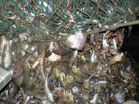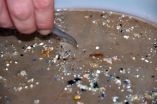(Press-News.org) When a pregnant mother is undernourished, her child is at a greater than average risk of developing obesity and type 2 diabetes, in part due to so-called 'epigenetic' effects. A new study in mice demonstrates that this 'memory' of nutrition during pregnancy can be passed through sperm of male offspring to the next generation, increasing risk of disease for her grandchildren as well. In other words, to adapt an old maxim, 'you are what your grandmother ate'. The study also raises questions over how epigenetic effects are passed down from one generation to the next – and for how long they will continue to have an impact.
The mechanism by which we inherit characteristics from our parents is well understood: we inherit half of our genes from our mother and half from our father. However, epigenetic effects, whereby a 'memory' of the parent's environment is passed down through the generations, are less well understood. The best understood epigenetic effects are caused by a mechanism known as 'methylation' in which the molecule methyl attaches itself to our DNA and acts to switch genes on or off.
In a study published today in the journal Science and funded mainly by the Medical Research Council and the Wellcome Trust, an international team of researchers has shown that environmentally-induced methylation changes occur only in certain regions of our genome (our entire genetic material) – but, unexpectedly, that these methylation patterns are not passed on indefinitely.
Researchers led by the University of Cambridge and Joslin Diabetes Center/Harvard Medical School, Boston, used mice to model the impact that under-nutrition during pregnancy had on the offspring and to look for the mechanisms by which this effect was passed down through the generations. The male offspring of an undernourished mother were, as expected, smaller than average and, if fed a normal diet, went on to develop diabetes. Strikingly, the offspring of these were also born small and developed diabetes as adults, despite their own mothers never being undernourished.
Professor Anne Ferguson-Smith, from the Department of Genetics at the University of Cambridge, says: "When food is scarce, children may be born 'pre-programmed' to cope with undernourishment. In the event of a sudden abundance in food, their bodies cannot cope and they can develop metabolic diseases such as diabetes. We need to understand how these adaptations between generations occur since these may help us understand the record levels of obesity and type 2 diabetes in our society today."
To see how this effect might be passed on, the researchers analysed the sperm of offspring before the onset of diabetes to look at the methylation patterns. They found that the mouse's DNA was less methylated in 111 regions relative to a control sperm. These regions tended to be clustered in the non-coding regions of DNA – the areas of DNA responsible for regulating the mouse's genes. They also showed that in the grandchildren, the genes next to these methylated regions were not functioning correctly – the offspring had inherited a 'memory' of its grandmother's under-nutrition.
Unexpectedly however, when the researchers looked at the grandchild's DNA, they found that the methylation changes had disappeared: the memory of the grandmother's under-nutrition had been erased from the DNA – or at least, was no longer being transmitted via methylation.
"This was a big surprise: dogma suggested that these methylation patterns might persist down the generations," adds co-author Dr Mary-Elizabeth Patti from the Joslin Diabetes Center and Harvard Medical School, Boston. "From an evolutionary point of view, however, it makes sense. Our environment changes and we can move from famine to feast, so our bodies need to be able to adapt. Epigenetic changes may in fact wear off. This could give us some optimism that any epigenetic influence on our society's obesity and diabetes problem might also be limited and/or reversible."
The researchers are now looking at whether epigenetic effects no longer have an impact on great-grandchildren and their subsequent offspring. So, if it's true that 'you are what your grandmother ate', it might not be true that 'you are what your great grandmother ate'.
INFORMATION: END
Inherited 'memory' of environmental impact on health may be limited
2014-07-10
ELSE PRESS RELEASES FROM THIS DATE:
Researchers harness a powerful new source of up-to-date information on economic activity
2014-07-10
ANN ARBOR--- Researchers at the University of Michigan, University of California Berkeley, and Arizona State University have developed a new data infrastructure for measuring economic activity.
The infrastructure uses aggregated and de-identified data on transactions and account balances from Check, a mobile payments app, to produce accurate and comprehensive measures of consumers' spending and income on a daily basis.
In a paper appearing in the July 11 issue of Science, economists Michael Gelman, Shachar Kariv, Matthew Shapiro, Dan Silverman, and Steven Tadelis ...
International science team solve biological mystery
2014-07-10
This news release is available in German.
An international team of researchers, led by the University of Leicester, has solved a long-standing mystery in biology, by identifying the molecular structure of a vital biological chemical. The debate – which has raged within the scientific community for years – boils down to something as simple as a hydrogen atom: is it there, or is it not?
The controversy centres around a form of enzyme called a heme (or haem, as in haemoglobin) at the centre of which is an iron atom (Fe) called a 'ferryl' which becomes oxidised when ...
Overfishing in the English Channel leaves fisherman scraping the bottom of the barrel
2014-07-10
Decades of overfishing in the English Channel has resulted in the removal of many top predators from the sea and left fishermen 'scraping the barrel' for increasing amounts of shellfish to make up their catch.
Sharks, rays, cod, haddock and many other species at the head of the food chain are at historic lows with many removed from the area completely.
These are some of the findings of a study led by marine biologists at Plymouth University, in association with international non-profit research organization WorldFish. They analysed catches over the past 90 years and found ...
Uncertainty gives scientists new confidence in search for novel materials
2014-07-10
Scientists at Stanford University and the Department of Energy's SLAC National Accelerator Laboratory have found a way to estimate uncertainties in computer calculations that are widely used to speed the search for new materials for industry, electronics, energy, drug design and a host of other applications. The technique, reported in the July 11 issue of Science, should quickly be adopted in studies that produce some 30,000 scientific papers per year.
"Over the past 10 years our ability to calculate the properties of materials and chemicals, such as reactivity and mechanical ...
Scripps scientists discover evidence of super-fast deep earthquake
2014-07-10
As scientists learn more about earthquakes that rupture at fault zones near the planet's surface—and the mechanisms that trigger them—an even more intriguing earthquake mystery lies deeper in the planet.
Scientists at Scripps Institution of Oceanography at UC San Diego have discovered the first evidence that deep earthquakes, those breaking at more than 400 kilometers (250 miles) below Earth's surface, can rupture much faster than ordinary earthquakes. The finding gives seismologists new clues about the forces behind deep earthquakes as well as fast-breaking earthquakes ...
Leading scientists express rising concern about 'microplastics' in the ocean
2014-07-10
Microplastics – microscopic particles of plastic debris – are of increasing concern because of their widespread presence in the oceans and the potential physical and toxicological risks they pose to organisms.
This is the view of two of the world's most eminent authorities on the subject, Professor Kara Lavender Law, of Sea Education Association (Woods Hole, MA), and Professor Richard Thompson of Plymouth University (UK).
In an article published today in the journal Science, the two scientists have called for urgent action to "turn off the tap" and divert plastic waste ...
Control strategy for Dengue, malaria increases risk of West Nile virus
2014-07-10
Mosquitoes infected with the bacteria Wolbachia are more likely to become infected with West Nile virus and more likely to transmit the virus to humans, according to a team of researchers.
"Previous research has shown that Wolbachia -- a genus of bacteria that live inside mosquitoes -- render mosquitoes resistant to pathogen infection, thereby preventing the mosquitoes from infecting humans with the pathogens," said Jason Rasgon, associate professor of entomology, Penn State. "As a result, researchers are currently releasing Wolbachia-infected mosquitoes into the wild ...
New study shows drinking alcohol provides no heart health benefit
2014-07-10
PHILADELPHIA – Reducing the amount of alcoholic beverages consumed, even for light-to-moderate drinkers, may improve cardiovascular health, including a reduced risk of coronary heart disease, lower body mass index (BMI) and blood pressure, according to a new multi-center study published in The BMJ and co-led by the Perelman School of Medicine at the University of Pennsylvania. The latest findings call into question previous studies which suggest that consuming light-to-moderate amounts of alcohol (0.6-0.8 fluid ounces/day) may have a protective effect on cardiovascular ...
Study looks at how Twitter can be used to address specific health issues
2014-07-10
Childhood obesity is one of the top public health concerns in the United States, with 32 percent of youths aged 2-19 classified as obese as of 2012. As health problems such as childhood obesity grow, individuals and organizations have taken to Twitter to discuss the problem.
A new study, led by Jenine K. Harris, PhD, assistant professor at the Brown School at Washington University in St. Louis, examined the use of the hashtag #childhoodobesity in tweets to track Twitter conversations about the issue of overweight kids.
The study published this month in the American ...
Sophisticated radiation detector designed for broad public use
2014-07-10
CORVALLIS, Ore. – Nuclear engineers at Oregon State University have developed a small, portable and inexpensive radiation detection device that should help people all over the world better understand the radiation around them, its type and intensity, and whether or not it poses a health risk.
The device was developed in part due to public demand following the nuclear incident in Fukushima, Japan, in 2011, when many regional residents were unsure what level of radiation they were being exposed to and whether their homes, food, environment and drinking water were safe.
Devices ...




